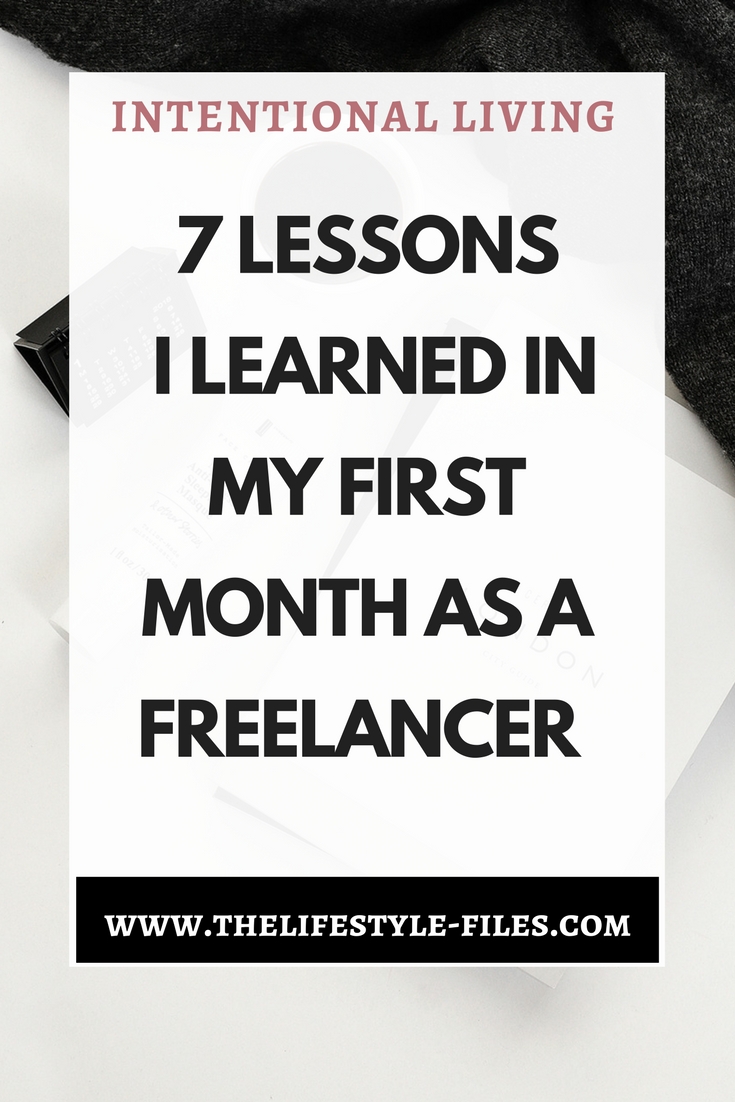
As I mentioned briefly here, it seems 2018 will be an exciting and challenging year, as I’m starting to work as a freelancer branding and strategic communications consultant.
Being a freelancer has always been a dream of mine. I’ve always known deep down that working independently, working on several different projects at the same time, and building something on my own was something I would want to try at one point. And that one point came now. I don’t yet have children, I’m currently in a financially stable position, have a safety net – everything aligned to try myself at this.
I gave myself a 6-month deadline – if I do not see any progress or hope for progress in that time period, I will reevaluate the situation and go back to a job. It wasn’t a completely easy decision, but as I mentioned several times, I try not to let fear or self-doubt deter me from my goals. I would like to say that at least I’ve tried.
This last month was exciting but challenging at the same time. I have nowhere near enough experience to start a course on how to start a freelancing business, but I thought the very first impressions might also be interesting to anyone who’s in the same situation or toying with the idea of going freelancer.
1// It’s important to ask and promote yourself. In fact, you MUST.
If I didn’t totally abhor the words hustle or grind, I’d say this is the time to do those things. Some people have a natural ability for self-promotion, and if they are talented they do not cross over into the shameless and annoying territory. I’ve always admired those people because it was never my forte. I always thought my work would speak for itself and in fact, I must let my work speak for itself, without much self-promotion. I shied away from emphasizing my experience or my skills and never really dared to ask. Ask for an opportunity to present myself, to talk about a project, or to give a quote. Opportunities kind of found me, it was never a very conscious activity on my part.
Well, this is something I quickly realized needed to change. I cannot sit at home, waiting to be discovered. How should people know I’m available if I don’t spread the word? How will they know my skills can be useful if I don’t advertise them?
The good news is, it becomes much easier with practice. The first few times I called someone and said “hey, I’m starting doing freelancer projects now, let me know if you need help with something” was, to be honest, terrifying. But it also brought some opportunities. The answers ranged from “So glad you called, I just have this project and let’s talk about this” to “OK, we’ll keep that in mind”. Even if nothing comes out of those, maybe they would really keep that in mind and that would bring future opportunities.
I had to realize I really didn’t have anything to lose.
2// Shifting your mindset from having a fixed salary is harder than I thought
It’s interesting because if we really think about it, a fixed salary is still not a guarantee at all. A lot of things can happen: we can be fired, laid off for reasons irrespective of us, the company can have a bad year and must make cuts, or the global economic situation can also affect our employment opportunities. Still, we do not think about this all the time: a fixed salary seems secure.
When I made a decision to try freelancing, I had financial backup. I knew that even if I didn’t have any income for 6-8 months, I could survive. Sure that saved money was not intended for basic life necessities, but it could also work as a safety net. I also started with one contract and several promising opportunities that would mean that I could earn a lot more money than I made previously as an employee.
And still, the anxiety didn’t go away. I had to accept this as natural and as something that’s part of the package. The cost of everything I deemed important and chose to view as a priority (own business, freedom etc). I hope this will be something that I will get used to as time passes. And if not, there’s always the option of going back to a fixed salary.

3 // Long-term business plans are just as important as short-term income
Earning money and building a sustainable and diverse income stream are both important and it is sometimes difficult to balance or choose. Shall I take on a project that is good money, but not necessarily in line with my portfolio or doesn’t offer the same networking or reference opportunities as others may do? Or do I prioritize a long-term mindset and seek out projects and income sources that are sustainable and I can build on later? These are not easy decisions and not something I was prepared to think about. Of course, it’s a good situation if you have the option of choosing; don’t get me wrong, I’m not complaining. All I’m saying is that if you’re in the freelancing business this is something you might want to think about from day 1 and make a plan that works both from a financial and a business-building point of view.
4 // You must never undervalue yourself
The money negotiations are of course the most challenging part. When you don’t have a normal, monthly salary, it’s quite easy to talk yourself into concessions regarding your payment. You’re constantly worried that you’re asking for too much and thus are willing to offer less. But it’s a vicious cycle, because if you really undersell yourself, some bitterness and bad feelings will remain with you even if you get the job – towards the client, but most often towards yourself and your bad negotiating skills.
It was hard, but I had to draw some boundaries, while also keeping in mind that I’m just starting out, so I also have to be flexible in order to build my clientele. I established a minimum amount that I always ask for no matter what. And I will easily let it go if someone doesn’t think my work is worth that much.

5 // It’s a rollercoaster
Even if this has been my dream to try for years now, it doesn’t mean some days are not harder than others. I have to deal with self-doubt a lot, but it’s also a great feeling if a pitch goes well. My support system of family and friends also help me a lot, cheering me on in times of self-doubt.
6 // There’s a lot of waiting
Waiting for feedback is annoying. You’re second-guessing your offer and cannot wait for the response, which can often be delayed, because, well, people have a life and other things to do. Patience is key. Also, there will be a lot of free work, because not all offers will be accepted. Thankfully, my years at a communications agency have taught me this and I’m not particularly bothered about these “lost hours”. I view them as an opportunity to grow and a necessary investment. If even 1 out of 10 goes through, it’s great
7 // Organizing my life has never been more important
I thought I would have a lot of free time on my hands now that I’m fully working from home, but to my utter surprise, this is really not the case. I have to juggle more meetings, more commitments, more work while guessing the amount of time different projects need, and establish totally new routines in order to make this work. I’m no alien to working from home, but a couple tweaks were definitely needed.
Please share with me if you had similar experiences with starting a business or a consulting job! Hopefully, in a couple of months time, I’ll be able to get back to you with a lot of helpful tips on how to grow a business.






First of all congratulations on embarking on your own journey! This is huge and I hope it works out for you. Number 1,4 & 6 speak so well for me as I’ve trying to reevaluate what I want to gain from my blog. I don’t want to rush my progress but I also will be stagnant if I don’t promote my blog which I don’t want. So I’m challenging myself to do better this year and I hope it yields something great.
Thank you so much! Yes, it’s exciting and scary at the same time, but the best things usually are like that. Don’t even get me started on the blog self-promotion, I still suck at it, and it’s such a struggle, so I can totally relate. But you’re doing so well, your Insta, stories, and twitter are always fun, but you still use it well to promote your blog. I should totally follow your example:) xx
I really enjoyed reading this post, and good luck for the future! The point about undervaluing yourself really struck a chord with me. I work full-time but have dabbled with freelancing, and even with a sable backup, I’m so worried that a potential freelance job will go the other way that I quote less than what I know I’m worth. And I agree – at some point, you just have to know it’s time to draw the line and walk away.
Sneha | lifewithsneha.com
Thank you so much Sneha! I find this price setting probably the most challenging so far. The first time I said no to a project was quite liberating actually. It seems silly but I was kind of proud of myself for drawing that line. I really hope this is worth it in the long run:)
I’ve always wondered about what life would be like for freelancers. I’ve been thinking more and more about how women should never undervalue themselves, their work, or their pay. It transcends careers and keeping these tips in mind I think is beneficial to everyone! Thanks for sharing!
Thanks for reading! You’re totally right, it doesn’t just apply to freelancers, in fact I wish I applied these in previous salary negotiations. It’s so sad how we, women tend to undervalue ourselves and so frustrating that typically men bosses take advantage of this.
This is so interesting! I’ve thought about freelancing in the past, but I’m afraid that it’s not the field for me. It definitely seems like you have to be your own cheerleader and really push yourself forward. Definitely interesting to hear your perspective about what you’ve learned!
GG | http://www.girlingamba.com